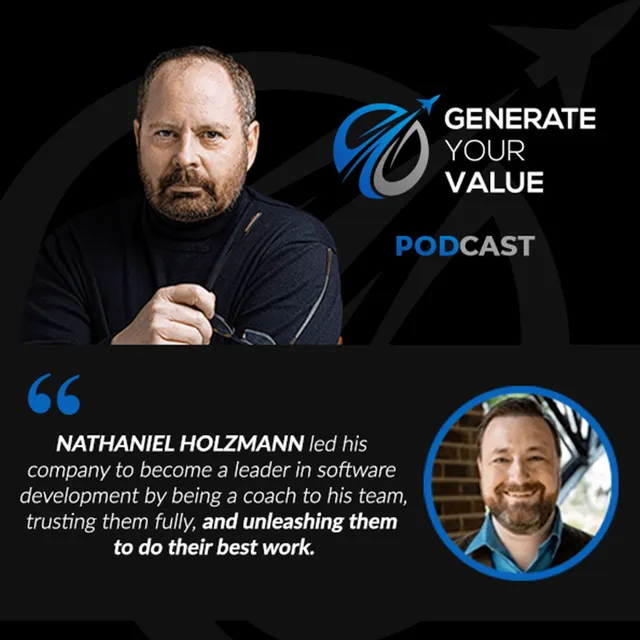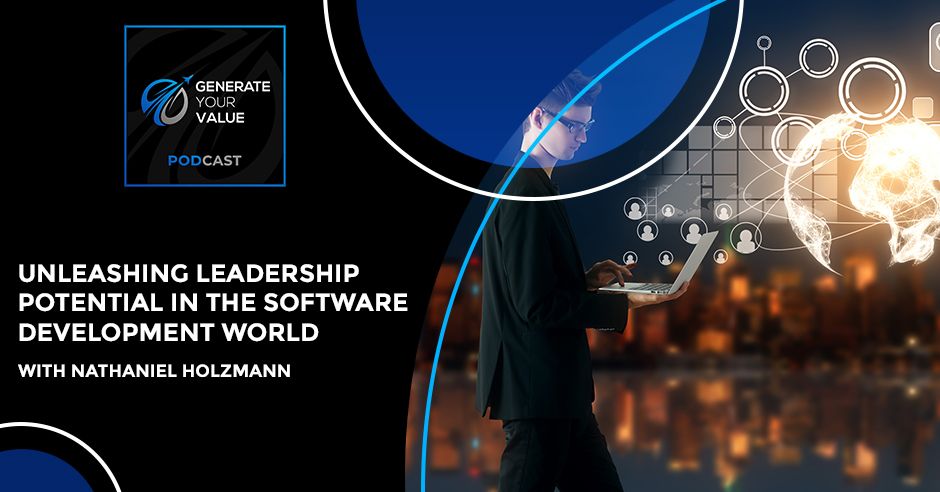True leadership in the software development realm goes beyond technical expertise—it lies in the ability to inspire, empower, and create meaningful connections. In this episode, your host Andy McDowell dives deep into the world of software development and leadership with a special guest, Nathaniel Holzmann. Nathaniel is the CEO of Low Code Road, leading a team that creates and supports low-code/no-code apps for global companies and end-users. He shares his journey, starting as a software support representative and evolving into a prominent figure in the software development field. Through his leadership, Low Code Road has become a leader in the industry, delivering cutting-edge technology that is both user-friendly and efficient. Discover how his leadership principles can be integrated into your own life, leading you to happiness and success. Join us as we explore the dynamic world of software development and uncover valuable lessons in leadership!
LISTEN TO THE PODCAST HERE
Unleashing Leadership Potential In The Software Development World With Nathaniel Holzmann
I got a text message from my other co-host, Zach Levy. If you’ve been in business long enough, you always have those fires that popped up. Zach had a fire that popped up and unfortunately can’t make it for us during this episode, but that’s okay. We’re all about moving forward on this show. In this episode, I have a great guest for you, probably the first guest we’ve had all season that’s purely in the software development realm.
I did some software development in my career at Boeing. I’m anxious to compare notes and talk about that world, particularly where it’s going and those types of things. I’m hoping out of our conversation that you get some golden nuggets relative to A) The software development world, but also B) Leadership, life, and things that we talk about on this show. You might be able to use and integrate into your life on the way to join happiness and success for yourself.
My guest is Nathaniel Holzmann. He’s located in Nashville, Tennessee, just up I-75 to I-24 from Atlanta. Some people may call that a stone’s throw. Some people may go, “That’s forever going down the road.” It’s on your context in life. Nathaniel is an entrepreneur, investor, husband, and father of seven, so you know what his life is like.
He has a twenty-year career in the software industry. In 2004, he started working as a software support representative. As part of his efforts, he worked with developers to fix the software they wrote. They launched him into career-helping companies and individuals build great software products, both as a product and a project manager. Software development experiences span all organizational types, including privately owned, venture capital, and private equity, and I’ve been in it too, all those government organizations. The kindred spirit there because that’s what I did at Boeing. It was to deal with government organizations.
Years ago, Nathaniel was introduced to low code as an alternative to traditional software development. That technology has continued developing and is now how companies and individuals can build highly customized software that previously would cost hundreds of thousands or maybe even millions of dollars to develop. They can do it for pennies on the dollar now.

He’s the CEO of Low Code Road. Nathaniel has the privilege of leading an amazing team of people from around the world to build and support low-code and no-code software applications for hundreds of companies and thousands of end-users. That being said, Nathaniel, thank you so much for taking that valuable resource of yours called time. We know it’s limited to take time out of your schedule to come spend some time with us and share your wisdom.
It’s my pleasure. Thanks for having me on, Andy.
I just read your bio, but we’re big on storytelling here. I like to give our guests the first 3 to 5 minutes just to give that Reader’s Digest version of their life. Where did you grow up? Where did you go to school? How did you get your career started? Why software? Those types of things.
I grew up all over the world. I’m an Army brat and then in missions as well. My family was in Texas and Europe. I was born in California. I lived in Upstate New York during my high school career. That’s where I met my wife. We were high school sweethearts. We got to know each other. I went off to Bradley University in Peoria, Illinois, and got my undergrad degree there in International Business. I had a pretty good rounded background as far as business goes. I got to learn about accounting,
marketing, finance, and all those things that you learn.
I’ve always had a passion and interest in computers. Learning basic programming, which was to build program languages. Building 386 or 286 PC from parts and assembling it, all that kinds of stuff, mail order PC. That was the thing back then. That led me into an interest in my own computers. I had my own computers back in high school, but I never got into the programming scene.
College was using computers, and I was actively involved. After college, I went into management. I worked with a couple of different companies in their management training programs. I ended up doing some work through a church trying to get my alternator changed. I was the guy from church who does car repair. We ended up, I was just making small talk. I was like, “Where do you work?” He’s like, “I work at a web services company.” I was like, “I enjoy computers. If you ever need help, let me know.” I was thinking of volunteer work. He’s like, “Send me your resume.”
Long story short, I ended up getting hired to do technical support for a company down here in Nashville and built up their tech support division. It was originally their phone. Their tech support was actually going to the programmers. I got to be the liaison and no longer having programmers be the ones who are answering the phone, which is not a good thing.
It’s that first-level vetting triage.
It was a new technology back then. This was in the early 2000s. Multi-screens or multiple monitors weren’t a thing. Everyone had one monitor. It’s a lot of tech support because the software we’re using required two monitors. A lot of the tech support was helping users with basic technology questions. It was church software. It was used for presentations in churches. Our biggest competitor was PowerPoint. Helping the old lady secretaries volunteers figure out how to use our software. Sometimes I was like, “Just go play solitaire. Open games and play solitaire.” Believe it or not, I don’t know if this is true, but it makes perfect sense to me that the reason Microsoft came out with the solitaire game was to teach people how to use the mouse.
I wouldn’t be shocked at all.
The point-and-click that you had to have didn’t exist. People would never use a mouse before and weren’t very familiar with computers. Having a game that they are familiar with like solitaire, and being able to learn how to point, click, and move that mouse around was a key component for part of their user experience development.
That’s where all the jokes came from, where people were putting it on the floor thinking it was some pedal that they had to step on to do something.
I literally did tell a secretary, “At least once, if not 2 or 3 times, I want you to go play solitaire. Tell them the tech support team told you to play solitaire as part of your job for another hour. It’s because you don’t know how to point and click.”
Do more than a game because we want you to use the menus. You go up there and figure out how to change the difficulty level and other things about the game. It’s more than just clicking on cards.
I had people calling me and saying, “Right click or left click?” “Let’s get you through that, and then we’ll help you learn how to use multiple monitors and displays.” That’s where it started. That’s something I realized I enjoyed and loved. Before that, those were jobs, but they weren’t careers. That took off into operations and IT stuff.
I ended up getting hired by the company, moving my family down to Nashville. I was working at various companies here in Nashville around software development, offshore project management, and most of which were consulting agencies or software development agencies. You get to experience a lot of startups, VC-backed, and all of that kind of stuff working with those different organizations. Lots of good stuff. It’s brought me to where I am, which is the low-code and no-code technology.
We’ll get into that later in the conversation. It’s safe to say you’ve been in software for a little over twenty years. You started back in the ‘90s. I can remember the Y2K days. Working in the aviation world at that time, everybody was afraid all the airplanes are going to fall out of the sky. The FA administrator at the time actually flew on an airplane that was up in the air when the century turned over just to prove that everything was going to be okay.
It was a big thing. The concept was not farfetched. It definitely was an issue and there were a lot of Unix systems and Linux systems that were not built to handle four-digit years.
It’s like when somebody tells me they’re engaged and about to get married, “I’m getting married in two weeks.” My comment to them is always, “Don’t sweat the stuff that goes wrong because that’s the things you’re going to remember the most and laugh about on down the years as you’re going through the wedding book with all the pictures and everything with your husband or wife.” To me, Y2K is like that now. We were sweating and so forth, but now we chuckle about it because the issues we face in the computer world are so much bigger than Y2K.
They are so much bigger. The good news is there are still a lot of areas in that technology requires that kind of attention but a lot of it is improved, so the scope of risk is decreased as a percentage.
What do you think are 1 or 2 things that have changed a lot about software coding and programming over the last 20-plus years?
I’m not a programmer, so I’m going to have to diverge a little bit from your question.
From your context. From the hill you sit on in the rockies, where have you seen the biggest changes?
I think the funny thing is there’s been some significant improvements. The biggest one is probably Agile software development. That has taken the world by storm and significantly improved the user experience from the developer’s perspective. Also from the end-user perspective. I sit in the middle. I get to help lead that charge, or I’ve gotten to help lead that charge. It makes a huge difference. We’re continuing to refine how we do software development.
There’s always this pendulum of what we call Waterfall versus Agile development. The biggest question is, “How do I get to value as fast as possible?” Making sure that we stay focused on that. Agile development practices have really made huge strides. That would be the one thing. That mindset of being able to deliver value in incremental stages as opposed to trying to deliver it all at once.
I had an interview with a person who’s head-deep in Agile development for this show. Boeing got into it maybe 4 or 5 years before I got laid off. I got to participate in the exercises, even though I was a business leader. From a business leadership perspective, in some cases, an actual end-user perspective, what I enjoy about it the most is that you’re getting involved in the quality control, testing, and those type of things much earlier in the process while things are ripe in the mind. You’re a lot better, and it’s less overwhelming as an end-user than what it used to be.
It used to be, “Version one of the app is out. That’s the first time you see it. We need you to test it.” “You’re asking me to wipe my calendar clean for the next 2 or 3 weeks and do nothing but test this product.” I equate it to people on the show who keep hearing me, “Use this example about how you eat an elephant.” In the olden days, it was, “Here’s the elephant. Now go eat it,” versus, now with Agile, it’s like, “Eat it in little pieces as you go along.” It’s so much easier.
We used to have books of specifications, and then we’d be testing through the software and saying, “On page 63, paragraph 2, section 3, it says that the software’s going to do this, and it doesn’t. Go fix it.” That is just not a good way of doing collaborative work. What we’ve got now with, you look at your iPhones, Androids, or all the apps that you have in the app store. The fact that they got updates every two weeks and the way that they’re doing software development. Even Tesla is rolling out, and this is hardware. They’re doing updates every couple of weeks themselves for their cars. That’s crazy if you think about it that I can build software in an Agile methodology to help run a car. I don’t know if Boeing’s gotten quite that frequently.
I don’t know. I was on the services side, so I wasn’t privy to those types of things, but I do know the software I use to edit this episode after we do the recording. I only open it up once a week. I guarantee you, every time I open it up, it says, “New version available. Please restart.”
You don’t have to download it and do all this stuff.
No. You just push the button, and it restarts and does this thing. It takes 30 seconds, and away you go. I don’t mind it at all. I find it rather interesting.
Rather nice, useful, and helpful. The fact is that we’ve gotten a lot farther along when it comes to that kind of technology. I think that’s hugely valuable.
Let’s move to a different subject. You manage people around the world, right?
Yeah, absolutely.
In this day and age of the pandemic, the hybrid work model, and those types of things, I’d have to imagine at Boeing, we were about three years deep into doing video conferencing in an effort to save travel expenses before the pandemic hit. I was already fully versed in video conferencing before the pandemic forced it on everybody else. What about yourself with the whole hybrid managing people from afar? It sounds like you’ve been doing it for a number of years. The pandemic was abrupt.
Even in the software development world, I was working with Central America, India, and Eastern Europe. Developers all around the world. At first, it was video-only calls, and developers have a pension for not wanting to turn their cameras on, but eventually, we were doing video calls. I would still go onsite occasionally, once a year or once every couple of years because there’s some value. There’s always going to be value in connecting with people and actually breaking bread with them.
In general, I’ve been doing remote team management for years. The pandemic didn’t change anything for that. It just meant I couldn’t visit them. From a technical perspective, there’s going to be value to be had from collaboration. Having your team offshore or overseas in a centralized region or having 2 or 3 people being able to get together if necessary is very helpful. Even that isn’t necessary. If you’ve got good people, they can figure out how to work together. The big thing is the technology that we have now compared to the technology that we had during the 1950s.
I can’t say I’ve watched Mad Men a lot, but the technology that they had required in-person connections. Now, I couldn’t run my business without the technology that exists now. It wouldn’t even be possible. Back when I was in college, I was paying hundreds of dollars a month in phone bills. Now, I can call anyone in the world for free. The marginal cost is nothing compared to what it used to be. The technology that we have now is so amazing, more advanced, and more valuable. I love it, and I take advantage of it. That’s the thing that I tell your audience, too. Take advantage of it. Don’t let it take advantage of you. Don’t hide from it.

One of the things I had to learn in my Boeing days is I was working with business strategy. I sat down to write my first business plan for the business that Boeing asked me to build. When I looked back at it 5, 6, 7 years after I first wrote it, pulled it out for some nostalgia reasons and just looking through it, I scratched my head. I said to myself, “I would’ve never been successful on this 6 to 7 years later, still a valid business plan. Maybe even more valuable now than it was back then.”
The problem was the technology was not around to do it. Either it wasn’t around or it was so expensive, it would’ve thrown the financials off. Those type of things is such an important part of understanding when it comes time to do business strategy. It’s the reason why I got my Master’s in that connection between strategy and technology.
Timing is everything. You can be too soon, too late, or just on the market.
What advice would you give somebody who’s maybe starting to delve into managing remote teams? What kind of management style have you found works best?
I think the biggest thing is learning to trust your team. You’ve got to learn how to trust your people, trust and verify. You got to trust them to know what they’re doing. If you don’t trust them to know what they’re doing, then you have no business leading a team of remote people, or you’ve got the wrong people on the bus. One of the two.

I’ve always told my clients that it’s even more imperative that you’d be more of a coach with your people. I agree with you. It’s trust and verify. In that verification, if you find things aren’t going the way that you had a vision for or you communicate it to them, you got to start coaching. If you had them in the office, whether you knew it or not, you may have done little tidbits of coaching along the way because you’re visually monitoring what they’re doing, and you’re making little comments here or there. You don’t have that ability when they’re remote.
Coaching becomes more of event-driven where you schedule time, and you have those coaching conversations all at once or in one event as opposed to those little bits and pieces you do in the hallway or at their desk. That’s what’s really changed. I agree with you. Trust, verify, and coach. It is so much more important these days in managing people. Let’s talk about low-code. I had never heard that term until we had our initial conversation about coming on and doing this episode. You educated me then on what low-code is. For our audience, can you talk about what low-code is and how it came about?
Low-code is basically a software. Let me start by saying it’s software. What it allows me to do is build software without needing to be a programmer. In the same way, if you’re familiar with website development back in the days of MySpace back in the early 2000s, there was a huge influx of website development software platforms that allowed you to create your own website. MySpace was one example. MySpace doesn’t exist anymore. It’s still around, but not anywhere near as popular as it was.
There were things like WordPress that came out. WordPress allows you to build a website. Specifically, it was designed for blogs and content management. You didn’t have to know HTML, CSS, JavaScript, or PHP, any of these programming languages, to build a website. You just had to be able to log in and start typing effectively.
The same thing is true now with software. I can build software without needing to know any of the underlying programming languages. Sharp, C-Sharp, C, C++, or Swift, any of the programming languages that you need to know, you don’t need to know them anymore. They’re taken out of the mix. Now I can build software to run my business or the next startup idea, whatever that is. I can build software without needing to know programming. That’s what low-code and no-code are. They all have different flavors. There are lots of different platforms out there that allow you to do this, and then we build off of those for businesses and individuals.
I’m going to date myself here. When you and I were having the initial conversation, the thing that came to mind for me back in my coding days was this. If you had some kind of mathematical function or something of that nature that was going to be used or needed quite a bit through different parts of the program, you would develop a sub-routine. You only had the right to code for that mathematical function or analysis or whatever you’re doing once. You created a black box by doing that. You pass the information it needs, and then it passes back to you the answer. You don’t need to know anything about what’s going on in the inside.
Another programmer could write that sub-routine and document, “Here’s the name of it. This is what you have to pass to it. This is what is going to pass back to you.” You just build all that into your call of the sub-routine. You never had to worry about what’s in the black box. This sounds a lot to me like I know in my own website, building it, I’ve got drag and drop. I want to build something that’s got a link to an article I wrote on another website. I drag and drop a link box, put it where I want on the page, give it the link to where it’s going, and voila, you’re done. I don’t have to know any of the code that’s behind it or anything else of that nature.
It has this function of displaying the graphic that’s associated with the page and the link such that if somebody presses on that link, it takes them over to that website and article, and voila. It takes me, the user, fifteen seconds to plug and play, even though there might be an hour’s worth of coding or half hours’ worth of coding behind it to develop that little widget. That’s unbeknownst to you, but that’s where software is going. As you said, how can we make it plug and play that we get more people involved and opens up the market?
What we’re now seeing is the ability of what they’re called citizen developers. It’s this new term that’s being invented. It’s basically the people who know the business or know what I want from a process management system. I know because I have specified knowledge. I know what I need it. They used to be called business analysts. People would go out and interview the business owners and then write down all the specified knowledge.
All the different departments translate it for the programmers. Basically, they had this whole team of people who would go in, analyze what the processes and systems are, and then write it all down, document it, and then give it to the programmers. Now, I don’t need them anymore. I don’t even need the programmers for a lot of this stuff. I can be a business knowledge expert in my specific field and I can build software for my business, department, and specific personal needs without needing any of the other team members.
There are risks inherent in that obviously because you don’t have the documentation, and you’ve got a single source of failure. Lots of risks but lots of opportunities. Huge amounts of opportunity. The most expensive person in a software dev shop is the programmer by far. If I don’t need the programmers and business analysts, if I can get the process. Here’s the thing. The process is always done in Excel. Right now, it’s spreadsheets. People will take spreadsheets and solve their needs using spreadsheets. We get them out of spreadsheets, out of Microsoft Access, which some people do, and into a scalable solution.
Access is still around?
Believe it or not, it is. Very rare, but it’s still around a little bit.
They’re building processes with Excel spreadsheets.
Yes. I’ve seen companies run on 50-tab Excel spreadsheets. Pretty much every company I talk to, they’re all using spreadsheets.
Maybe it’s not running the whole business, but it’s my department or my division or just me. I don’t like the CRM system, so I’ve built my own using spreadsheets. There’s a simple one. I need something to do quoting. I’ve built a spreadsheet so my sales team can do quoting. I need to manage my inventory. Our inventory system is currently using books, and that just doesn’t work for me.
That’s because QuickBooks is an accounting system. It’s not an inventory system. We build all of those types of things because what they’re doing right now is not scalable, and it’s always inevitably going to end up being a limiting factory bottleneck to business growth.

It reminds me of my division of Boeing got more into software development. They’re bringing in Agile. They had these very large, cumbersome project management software pieces. I had project management needs. Typically, with my consulting practice, I only had 1 or 2 people working on a project for a specific government. They were trying to force this elephant down my throat when Microsoft Project would take care of our needs.
I had to keep pushing them at bay going, “My business is not the typical business within Boeing. It’s services-based, consulting-based, and project-based.” The software I have to use is made by other companies because Boeing has nothing. We don’t do anything like anybody else within the company. There is no business equation that makes sense for us to develop something like this on our own.
Some people find that there are solutions out there. I’ll be the first to tell you, don’t build it if you can buy it. If you can buy something that’s going to solve your need, great. At a certain point, though, if you have to change your business process in order to fit the software, you’ve got a problem. That’s where it gets to be a problem for our customers. Sometimes they can’t find software out there on the market. There is nothing to fit that need, or it’s going to hit 50%. At that point, you’re better off building your own because the other 50% is going to be key in order to be successful. Sometimes you can get away with it, sometimes you can’t. It just depends on the process.
I’ll tell you that there are so many businesses where custom manufacturing is a great example. You have to build custom manufacturing custom systems. If you’re a realtor, there are tons of software out there. If you’re selling high-end bespoke commercial real estate, I don’t think there’s going to be software to solve your specific needs because the things that you’re going to have to track are different than your average three-bedroom, two-bath house. The metrics by which you want to manage your systems and your processes are very different. The same is true with any business in any industry. There are going to be times when you can go pick something off the shelf, and it’ll work great. There are going to be times when it’s not going to fit. That’s where we come in.
For me, it begs this question, and the answer to this question might be both. It seems to me that back in the day, when you and I were getting started, people felt like the path was, “Go get a Computer Science degree or an Engineering degree. Get something that’s all technical-oriented to have the credentials that business is willing to hire to do the work that they needed.” With a low-code scenario, it seems like people that don’t have as much propensity towards technical mathematics or scientific kinds of things can get into this world. That’s path one.
Path two, as computers came on board, down the road, it didn’t matter whether you had a finance position, business position, operations position, or whatever, you had to develop skills in PowerPoint, Excel, Word, and all those kinds of tools to be able to do your job because that’s where the world moved. This is where both answers are a possibility here.
You see, the world needs to move towards the people that are not as technically-oriented, need to come into the job force and use these kinds of tools to get things done. Is this going to be added to the PowerPoint, Excel, and Word worlds where, “For you to survive, no matter what your role is in the company, you need to learn how to use these tools to develop software? It’s going to do the processes that you participate in for the company.”
I don’t think low-code or no-code is ever going to be as ubiquitous as Microsoft Office, Word and Excel. WordPress is a good counterpoint. Where we are in the low-code, no-code space is where web development was back in the early 2000s. It’s definitely got a twenty-year, maybe less with some of the new technologies out there, which we can touch on real quick. I think that the big thing that I tell all my kids is either you’re going to be telling computers what to do, or they’re going to be telling you what to do. That’s the real question.
It’s not that either option is bad. It’s just that you understand that’s where the world is going. Learning how to tell a computer what to do requires certain logic skills and creative, critical thinking skills. Those are going to be in demand no matter what. The low-code or no-code technology, I don’t think is ever going to get to be as ubiquitous as a word processor or a spreadsheet system. It’s not going to be there. Knowing how to work in them and use them is going to be key for the next twenty years or so. Again, it’s only for specific niche jobs. It’s not going to be everyone.

Outside of AI, where do you feel like software is going in the next twenty years? We’ve reached a plug-and-play environment with software.
I am not a futurist, but software is definitely trending towards more personal and more ubiquitous, more intimate knowing, and it’s going to be customized for your specific needs. That’s all there is to it. That trend is going to continue to the point where we are going to have personal assistants that are cloud-based that know everything about us. Eventually, you’re going to no longer need a secretary or virtual assistant. You’re going to have a literal virtual assistant who can schedule meetings, keep track of who you need to talk to, what you want to do, book flights, and all those things that a traditional VA does. That technology is coming, and it’s going to be here sooner than we expect.
Software is definitely trending towards more personal, more ubiquitous, and more intimate knowing. It’s going to be customized for your specific needs.
If I put my business executive coach hat on from that standpoint, we often talk to leaders of businesses about you’ve got to get as unique as you can. If you don’t, you’re going to be a commodity. You’re going to be competing on price and service type of things. I think that’s where software development has gone. It’s been around 20 to 30 years now to do what we would call the basics. Whether it’s a web design or those types of things, it’s become more commoditized where you can capture value out in the world is to go outside of that and get into the uniqueness of individuals.
How can we bring software development that may have a commodity piece as a foundation, but we’re going to build on top of that to get unique for individuals? That’s where people are going to be willing to spend their money and try and extract value from a product or service that you build. I was born and raised with computers. I was moving a mouse around the tabletop when I was two years old. The computer is a natural thing. I know I’m going to need the rest of my life. It’s part of the lifestyle, and what’s different in you, you got for my world. The mouse and the computer are ubiquitous. You carry it around with you every single day in an iPhone, Android phone, or whatever it is. You got a computer with you all the time, and it’s part of your life. It’s so important in your life.
More powerful than the one that took me under the moon. It’s in your pocket, and it can talk to you.
It’s getting more of a commodity product. You can’t live without it. You got to have one because our life is so built around having the access to the information you need. My dad is 88 years old. I got Alexa sitting next to him, and I got my iPhone. He can’t do a liquid technology, but he’ll ask me a question, and he’s amazed that I can push five buttons on my iPhone, and I got an answer for him. He knew back in the day, it would take him two weeks to research in the library to find out that piece of information.
We don’t need dictionaries anymore.
We talked a little bit about in the green room, you’re not an AI expert. What impact do you think that technology’s going to be in the world?
Predictive typing, if you’ve seen that in your phone or in word processing, that’s a form of AI. We can already tell AI to generate information. The trick is to make sure that it’s real information. I saw an article where AI is coming up with inventing court cases that never existed. It’s hallucinating. That’s what they call it. It is inventing court cases that never existed. It is even writing summary briefs of those court cases that never existed. There’s definitely room for improvement.
We can already tell AI to generate information. The trick is to make sure that it’s real information.
The fact is that technology and AI, in particular, are not yet and won’t be for a number of years able to be critically thinking. The technology is there. All the pieces are there. It’s just a matter of assembling it. Once we get to critical thinking, then we’ve got some significant risks and opportunities. At that point, you’re dealing with technology that can exceed our capacity to understand or develop.
I feel like it’s in the emulation stage. Not critical thinking, but it’s quick access to information and being able to pull stuff together and present whatever kinds of things. As I tell people, technology is a tool like the internet was when it got invented and started becoming mainstream. The general public could start accessing it. It values other things that come into play because it is a tool. Human nature, values, and everything that we talk about for ourselves come into play. Love and fear, good and evil, and everything else is going to come into play with it. That’s what we got to be worried about moving forward. We need to regulate it or whatever we need to do to ensure it.
Those discussions are already starting.
They’re already starting now. Just like what they did for the internet back then. Our time is coming to an end. I can’t thank you enough for taking your valuable time. If people wanted to reach out and know more about low-code, no-code, you yourself, and your company, what would be the best way?
We’ve got our great website, LowCodeRoad.com. They can reach out to us at Navigator@LowCodeRoad.com. I see all those emails, and I’ll be happy to respond.
Last question that we ask all of our guests. What do the words “generate your value” mean to you?
I think that generating your value is putting your mark on the universe and the world. To generate your value is to leave value in my world. It’s to make a positive impression on the people around me.
Generating your value is putting your mark on the universe, putting your mark on the value on the world.
For me, it’s about working on the inside so that you can have actions, behaviors, thoughts, values, etc., that you can start delivering positive value to the world no matter where your life hits. Your community, your career, and all those types of things.
That’s exactly right. Thank you so much.
Thank you so much for coming. We’re going to wrap it up. For the audience, Zach, who’s not here, unfortunately, and myself hope that you can pull some golden nuggets out of our conversation. You can then extract and integrate on your journey to find joy, happiness, and success in your own life. Nathaniel, we’re on a mission to change that button that says subscribe to follow. Zach and I are on our journey with the show to make that happen in the world. Have a great day. Have a great week. Keep generating your value in the world. We’ll see you next time with another episode, another great guest like Nathaniel right here on the show.
Take care.
IMPORTANT LINKS
- Nathaniel Holzmann
- Low Code Road
- MySpace
- WordPress
- Navigator@LowCodeRoad.com
- https://www.LinkedIn.com/in/NathanielHolzmann/
ABOUT NATHANIEL HOLZMANN

Nathaniel Holzmann is an entrepreneur, investor, husband, and a father of seven.
He has a 20+ year career in the software industry. In 2004, he started working as a software support representative. As part of his efforts, he worked with developers to fix the software they wrote. That launched him into a career helping companies and individuals build great software products; both as a product and project manager. His software development experiences span all organization types including privately owned, venture capital, private equity, and government organizations.
Over 10 years ago, Nathaniel was introduced to low code as an alternative to traditional software development. That technology has continued developing and is now how companies and individuals can build highly customized software, that previously would have cost hundreds of thousands (or even millions) of dollars to develop, for pennies on the dollar.
Today, as the CEO of Low Code Road, Nathaniel has the privilege of leading an amazing team of people from around the world. They build and support low code and no code software applications for hundreds of companies and thousands of end users.







